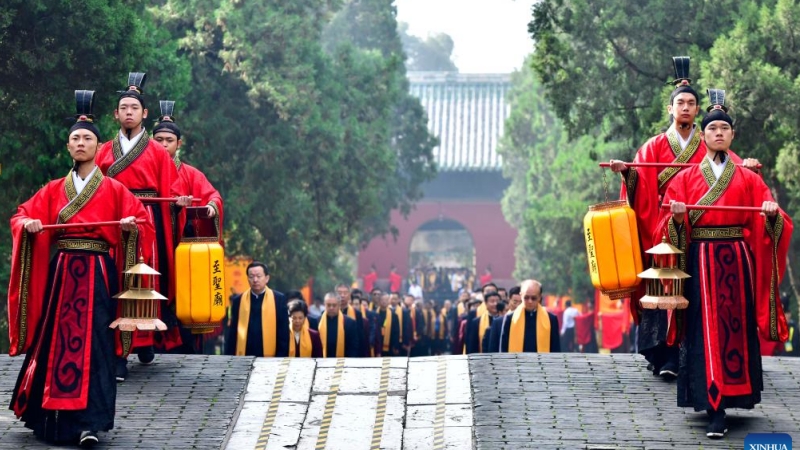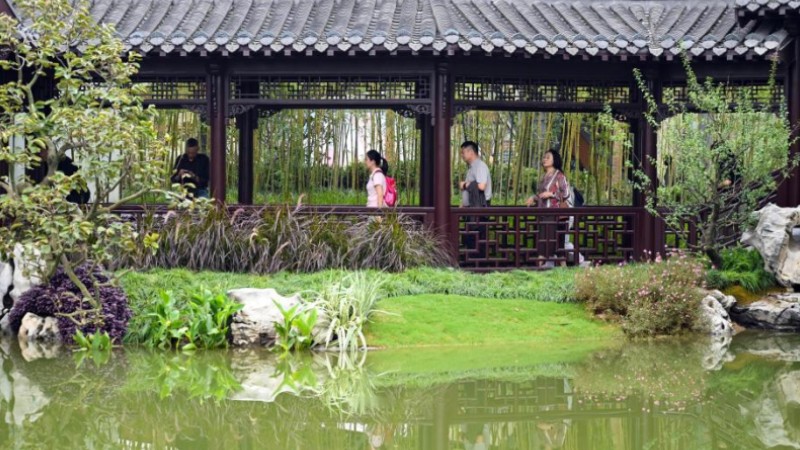West's lies about Xizang 'completely untenable': China's top diplomat
The facts will prove that lies related to China's Xizang (Tibet) Autonomous Region concocted by Western forces out of ideological bias are "completely untenable," China's top diplomat Wang Yi said at a forum on Thursday in Nyingchi, Southwest China's Xizang.
This year's forum, which has drawn more countries such as Afghanistan, will boost closer interconnectivity and partnership in the trans-Himalaya region, experts say, as it provides a multilateral platform for the integration of strengths, a key step for the opening-up and development of regional countries.
Wang, a member of the Political Bureau of the Communist Party of China Central Committee and director of the Office of the Central Commission for Foreign Affairs, made the remarks when addressing the opening ceremony of the third China Xizang Trans-Himalaya Forum for International Cooperation, which ran from Wednesday to Friday with representatives from more than 40 countries, regions and international organizations attending.
The trans-Himalayan region is characterized by a large population, diverse civilizations and substantial ecological diversity, and its development is crucial to the common well-being of people all over the world.
"The world is undergoing profound changes at an accelerated pace, and the Asian Century is on the horizon," Wang said, noting that countries around the Himalayas are geographically connected, have similar cultures and share a common destiny.
They share a high degree of similarity in ecological conservation and are partners in the journey toward modernization, Wang said, proposing that the region adhere to mutual respect and trust, and enhance exchanges and mutual learning.
Countries in the Himalayan region have always maintained frequent exchanges and regional countries aspire to benefit from China's rapid economic development. However, due to geographical constraints, there are natural obstacles to connectivity. This platform has opened up a new channel for trans-Himalayan countries, instilling confidence and fostering greater expectations for future openness, Qian Feng, director of the research department at the National Strategy Institute at Tsinghua University, told the Global Times on Friday.
According to statistics released at the forum, the total value of Xizang's foreign trade import and export in 2022 reached 4.6 billion yuan ($640 million), a year-on-year increase of 14.6 percent. Trade partners spanned across 95 countries and regions, with imports and exports to countries along the Belt and Road reaching 2.4 billion yuan. From January to August, Xizang's total foreign trade volume increased by 72.5 percent.
"Moreover, cooperation among trans-Himalayan countries has primarily been at the bilateral level. Now with this multilateral platform, countries can leverage their respective strengths to achieve complementarity and form a collective force. Although this is just the first step, it holds great importance," Qian noted.
On deepening cooperation, Wang Yi put forward five areas of focus - upholding mutual respect and trust and jointly maintaining regional unity; deepening mutually beneficial cooperation and working together to create an ecological civilization circle in the Himalayan region; accelerating green transformation and supporting sustainable economic development in the region; strengthening connectivity and promoting regional integration; and enhancing exchanges and mutual learning to rejuvenate ancient civilizations.
One of the major achievements of the forum was the release of the Nyingchi Initiative, in which China proposed to work together with trans-Himalayan countries to improve environmental governance, jointly address ecological challenges and strengthen regional biodiversity, natural resource and environmental protection.
China will also strengthen the construction of infrastructure including railways, highways, power grids, telecommunications and aviation in the Himalayan region, and build a comprehensive network for cross-Himalayan connectivity to further expand openness.
In addition, China will promote closer economic and trade exchanges, deepen agricultural cooperation, and jointly build a Himalayan economic cooperation belt.
This year's event not only attracted greater numbers of participants and higher levels of officials, but also included new members such as Afghanistan, which signifies the growing recognition and strong interest of the international community in the mechanism, experts noted.
Cooperation for the next step will mainly focus on infrastructure and connectivity, such as the extension of the Qinghai-Xizang Railway to Nepal and the extension of the China-Pakistan Economic Corridor to Afghanistan, they said.
Another new area of focus is the cooperation on green low-carbon development, water and soil resource conservation and climate change cooperation.
While the prospects for cooperation are vast, challenges still loom ahead. In addition to natural geographical challenges, there are political factors from certain Western countries that interfere with cooperation in the region, and even attempts at sabotage, observers said, calling on regional countries to maintain a high level of vigilance and adhere to their own strategic autonomy.
On Thursday, Wang also held separate meetings with Deputy Prime Minister of Mongolia Sainbuyan Amarsaikhan, Vice Chairperson of the National Assembly of Nepal Urmila Aryal, Caretaker Minister of Foreign Affairs of Pakistan Jalil Abbas Jilani, and Afghan Acting Minister for Foreign Affairs Mawlawi Amir Khan Muttaqi.
Photos
Related Stories
- Representatives attend third China Xizang Trans-Himalaya Forum for Int'l Cooperation
- Foreign envoys laud development of Xizang, calling a happy life there 'true essence of human rights'
- Young Tibetan woman becomes modern farmer in SW China's Xizang
- Xizang's Gyirong port becomes passageway to South Asia under BRI
- County in SW China's Xizang establishes river chief system to protect water environment
- Exhibition of Xizang's culture attracts throngs of visitors
- Xizang's high-quality development charts course for regional growth and beyond
- Infographic: Xizang witnesses astounding development 72 years after peaceful liberation
- Spectacular 'tree of the earth' in China's Xizang
- 20th Nyingchi peach blossom festival kicks off with tourists pouring into Xizang
Copyright © 2023 People's Daily Online. All Rights Reserved.









